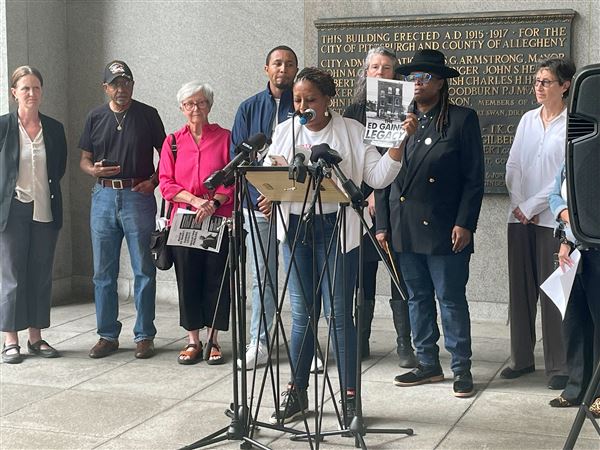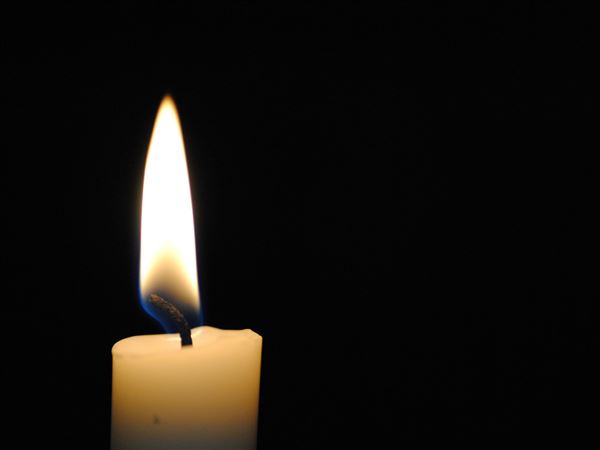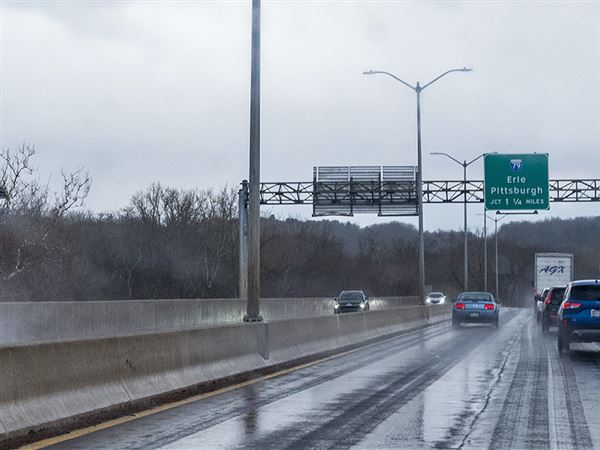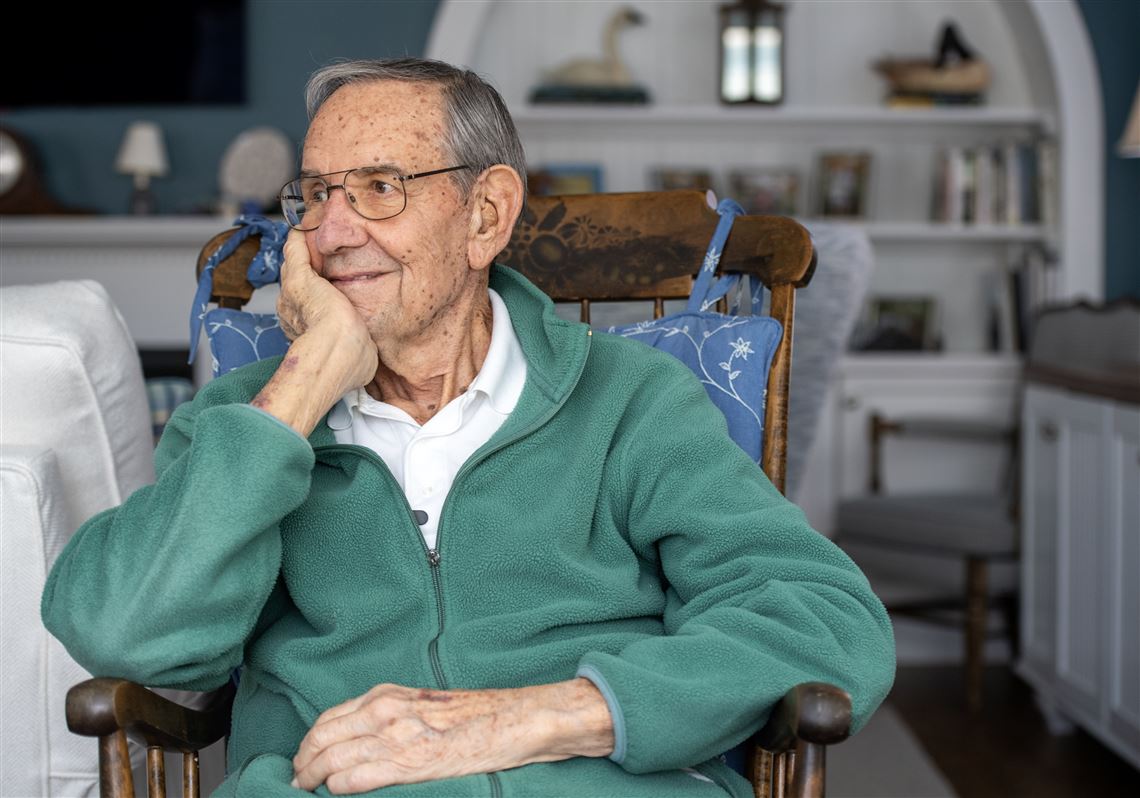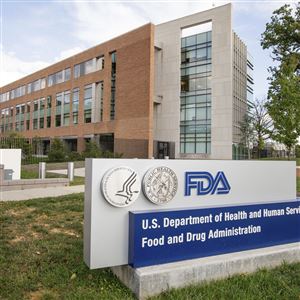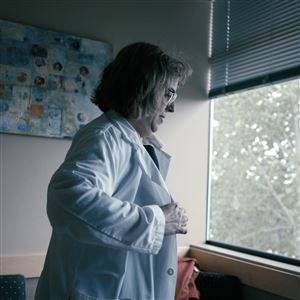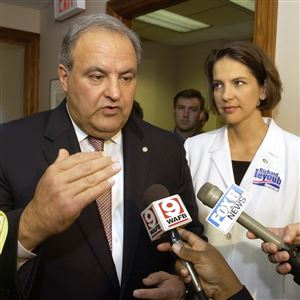Nearly 30 years before medical device powerhouse Philips Respironics launched one of the largest and most chaotic recalls of its kind, inventor Gerald McGinnis faced a crisis that threatened to cost his burgeoning company millions.
The founder of Respironics, who had been widely credited for creating the first mass-produced breathing machine in the United States, had discovered that another of his inventions had a serious flaw.
A resuscitation bag and mask known as the BagEasy was breaking down when it was supposed to push air into the lungs of patients struggling to breathe.
Respironics was a growing company in 1993, heralded for the continuous positive airway pressure (CPAP) machines that were helping patients sleep through the night, but still subject to the ups and downs of a tumultuous industry.
That year, Mr. McGinnis met with his engineers from the company’s Murrysville headquarters. Then he ordered all of 50,000 BagEasy devices — the second recall of the masks in as many years — pulled from the shelves.
The company's stock would plunge by 11% after the news broke, but the 59-year-old founder of Respironics was resolute.
"It wasn't even a question," recalled engineer Eric Kulikowski, the director of operations at the time.
Those who worked with Mr. McGinnis said it was a particularly difficult episode for the medical device inventor who had changed the lives of millions of people suffering from sleep apnea, a chronic and potentially deadly disorder that causes breathing to stop and start through the night.
But it was also an event that defined the way he ran his company, which grew to 4,900 employees and more than $1 billion in sales by 2007 — the year that the Dutch conglomerate Royal Philips swept in with a tantalizing offer.
Sixteen years after Royal Philips bought his company and renamed it Philips Respironics, Mr. McGinnis said he struggles to make sense of a new crisis that threatens to overshadow the legacy he built for nearly a half century.
In 2021, Philips pulled millions of CPAPs and ventilators off the shelves after it was found that foam placed in the devices could degrade into tiny particles and fumes, and potentially send toxic chemicals into the respiratory systems of users.
A Pittsburgh Post-Gazette and ProPublica investigation found the company kept thousands of warnings about the breakdown secret for years and only turned over many of the reports about the problem to the government after the recall.
The Food and Drug Administration has received more than 370 reports of deaths, 2,000 cases of cancer and more than 17,000 cases of respiratory ailments tied to the devices.
In a statement, Philips said its first priority is patient safety and that it regretted “the distress and concern” caused by the recall and that it would "continue to work hard to resolve this for our patients and customers."
Philips said that complaints about the foam were limited in the years before the recall and that when the company became aware of the potential significance of the problem in early 2021, it initiated the recall out of "an abundance of caution."
The revelations about the company's handling of the defects has left Mr. McGinnis fearful that patients will lose faith in a critical area of medicine that he once championed.
In an extensive interview — his first in the aftermath of the recall — the 89-year-old engineer described his profound disappointment in what happened to the brand that he created as well as concerns about company practices that risked the safety of millions.
“If you hurt somebody, the game is over,” he said. “You’ve got to take responsibility.”
Mr. McGinnis and his former employees in the United States and Europe say the crisis that has engulfed Philips and its customers shows how the company veered from the safety standards established decades ago when Respironics was forging a reputation as one of the world’s leading medical device companies.
As a biotech inventor who had spent years working alongside doctors at Allegheny General Hospital — where a medical wing is now named after him — Mr. McGinnis questions why Philips didn't tell the government or its customers of disturbing reports about the foam and quickly make repairs.
"You act on these right away. You don't wait," he said. "We'd get a complaint from a customer, [we would] really jump into the complaint, see what he was talking about so it wouldn't turn into anything."
LIFESAVING DEVICE
Mr. McGinnis, who still lives with his wife only miles from the massive Respironics factory that he once opened, grew interested in the need for breathing machines when he served as the director of surgical research at Allegheny General.
While making rounds with doctors beginning in 1969, he witnessed the cost of the medical device pitfalls first-hand.
For patients whose windpipes had closed, doctors at the time relied on a procedure called endotracheal intubation, where a plastic tube was snaked into a patient’s throat. Doctors would then use a syringe to push air into an inflatable cuff at the base of the tube, forcing open the windpipe.
But the cuff could overinflate. And as pressure built against the throat’s inner walls, the delicate tissue could stretch until the trachea burst, causing irreparable damage. Doctors had no way of knowing when they were about to push too far.
Mr. McGinnis was driven to solve the problem and would spend the next several years working from his home on the outskirts of Pittsburgh on a small balloon-like device that would automatically release excess pressure before it rose to dangerous levels.
Soon hundreds of the small pouches were hanging from his basement ceiling, “like rubber stalactites,” he said.
With a portion of his wife’s inheritance and loans from doctors totaling $13,000, he founded his first medical device company in 1971 in a move that would change his career. Five years later, he launched his flagship, Respironics.
“It was so intense that the doctors were calling in to Gerry McGinnis, saying, ‘Look: I’m going to sue you if you don’t get me a SleepEasy right now.’”
Soon, the work that he had carried out to help patients avoid the pain of endotracheal tubes caught the attention of a young pulmonologist who was trying to solve a problem that confounded doctors for years.
Dr. Mark Sanders had been exploring treatments for a little-known disease called obstructive sleep apnea, which can be deadly if left untreated.
For those who suffer from the condition, pauses in breathing through the night can last mere seconds or stretch into minutes, making deep sleep all but impossible.
Tapping into the technology that he developed, Mr. McGinnis and the doctor collaborated with others on a new device named the SleepEasy, a machine that gently pushed air through a mask with just enough pressure to keep the airway open.
The prototype was a loud, clunky contraption. When Mr. McGinnis hooked the machine up to one of his first test subjects, a local high school principal, he thought it might be too unwieldy to work at all.
“He put this ungodly face mask over his mouth and turned the really noisy blower around. I said, ‘I doubt you're gonna be able to go to sleep,’” Mr. McGinnis recalled.
But the groundbreaking device showed promise. “He closed his eyes and didn't wake up for three hours,” Mr. McGinnis said.
In 1984, the FDA cleared the device for the open market and by the next year, thousands were being ordered.
Respironics, after years of financial struggles, was suddenly rushing to meet the demand.
“We couldn't make them fast enough,” said Gene Scarberry, the company’s former technical director. “It was so intense that the doctors were calling in to Gerry McGinnis, saying, ‘Look: I’m going to sue you if you don’t get me a SleepEasy right now.’”
The work of Respironics was noted in medical circles around the world, partly because of the relationships it built with customers. “They provided us with everything we needed,” said Dr. Gustava Moreira, a sleep medicine specialist who treats hundreds of patients in Brazil.
Forging a connection between employees on the factory floor and the vulnerable people who ultimately used the machines would become a key part of the culture of the expanding company, said Mr. Kulikowski, the former director of operations.
“Gerry would say, ‘Assume that device is going to be used on or by the person you love the most. Now make your decision,’” Mr. Kulikowski said.
TACKLING PROBLEMS
During quarterly meetings, top managers from across the company would review quality control systems and delve into the most frequent complaints from consumers, former employees said.
Engineers probed for defects in the products they were shipping, and if multiple complaints emerged about the same problem, those reports were given a top priority.
“Gerry set the expectation of us very early on that talking about problems is OK — and hiding problems is not,” Mr. Kulikowski said.
He and others acknowledge that Respironics wasn’t perfect. The 1993 recall of the resuscitation mask was one of at least five times the company had to warn customers of a defect and pull its products from the shelves. In 2003, Respironics recalled 5,000 nasal masks after its engineers found patients were at risk of inhaling too much carbon dioxide.
In 2007, Forbes magazine took into account the company’s regulatory history and financial practices and named Respironics one of “America’s Most Trustworthy Companies.”
By then, Amsterdam-based Royal Philips, known for its televisions and light bulbs, had embarked on a buying spree of U.S. medical equipment companies. Respironics was squarely in the company’s sights.
The multinational corporation offered to buy the company for $66 a share when its stock was trading at $53. The board of Respironics, chaired by Mr. McGinnis, had turned down an earlier offer. This time, the board had little choice but to accept or Philips was prepared to take the deal to the shareholders.
The sale was announced on Dec. 21, 2007, with Royal Philips disclosing in earnings reports that the company would become the "centerpiece" of a division that offered medical devices for patient monitoring.
Mr. McGinnis was forced to the sidelines and later retired. “I never did see the inside of the shop after they sold it,” he said.
Former employees described a sudden shift in the way the new company responded to complaints about troubled devices. At Respironics, employees and their managers were expected to find answers and move quickly, they said.
Philips was a far larger international corporation with its headquarters in Europe, thousands of miles away from the main factories for CPAPs and ventilators in Western Pennsylvania.
Laura Adorni, a former longtime sales director at Philips in Italy, said the lines of communication between division leaders rapidly deteriorated as complaints about defective products came in.
“We never had any information on how to report anything,” said Ms. Adorni, who left the company in 2013. “Things were piling up and people were looking at each other and saying, ‘Who should I give this to? Who should I contact?’”
Margaret “Maggie” Yanov, who helped track customer complaints at the company, said the kind of teamwork that defined Respironics for years was no longer felt in the workplace. She left Philips months after the sale. “It's not the same company anymore,” she said.
In 2010, with many longtime managers gone, Philips started to receive complaints from customers and others about black particles turning up on pillows and contamination in the air tubes and reservoirs of their devices, ProPublica and the Post-Gazette found.
At first, the complaints trickled in but by 2015, the company had been hit with hundreds of reports about foam degrading inside the machines, records show.
DANGEROUS DEFECT
Patients using the devices later said they began grappling with unexplained illnesses — coughs that wouldn’t go away, mouth and throat cancers in people who’d never smoked, and kidney and liver diseases.
When Philips announced the recall, the company said the foam in the machines could release chemicals or break into particles capable of causing life-threatening injuries, but has since changed course and said further testing showed the devices do not pose appreciable harm to patients.
Three experts who reviewed test results on the foam for the Post-Gazette and ProPublica disputed that claim, saying the material tested positive for genotoxicity, the ability of a chemical to cause cells to mutate, which can lead to cancer.
Mr. McGinnis, who took calls from former employees and others in the past two years describing the massive recall, said the news was a “disappointment and embarrassment.”
"The culture at Respironics was they cared about the patient," he said. "The people really understood what they were doing. And [they] took it very seriously."
Though he no longer had an ownership stake in Philips, he said he worried that his old company — once a symbol of Pittsburgh’s economic transformation from a steel town into a hub of biomedical innovation — was now cast in a different light.
On a recent afternoon inside his one-story house, Mr. McGinnis, who suffers from Parkinson’s disease, gripped the handles of his walker and stepped carefully down the hallway, past rooms adorned with plaques commemorating the company he once built.
He has been granted more than a dozen U.S. patents for medical devices and has been recognized across the country for developing the CPAP and making it available to patients around the world. An endowed chair bears his name at Harvard Medical School in the study of sleep medicine.
But he remains worried that thousands of people may have been hurt by machines that still bear the Respironics name and were made in a facility that he once opened to save "many thousands of lives."
Audrey McGinnis, his wife of 63 years, said she stopped using her last name in public for fear of being tied to the ongoing crisis. For Mr. McGinnis, the failures that led Respironics to this point all tie back to an ethos that seemed to disappear with the team he had assembled years ago.
He said when his engineers discovered flaws in devices, the company "shut them down. And we did. We just said, ‘Christ, we can't do this.’” Ultimately, "this is a product we're selling that a patient is dependent on."
"The culture at Respironics was they cared about the patient," he said. "The people really understood what they were doing. And [they] took it very seriously."
After Philips bought the company, most of the managers who had worked for him were moved out, he said, and in the years to follow, "the Respironics culture died."
ProPublica investigative reporter Debbie Cenziper contributed to this report.
Michael Korsh: mkorsh@post-gazette.com
Michael D. Sallah: msallah@post-gazette.com
Mike Wereschagin: mweresachgin@post-gazette.com
First Published: December 29, 2023, 10:30 a.m.
Updated: December 30, 2023, 1:06 p.m.



